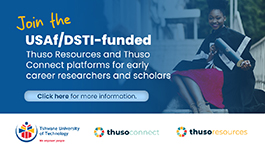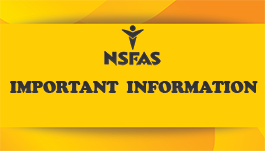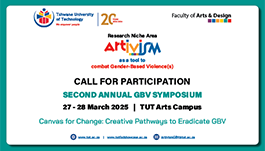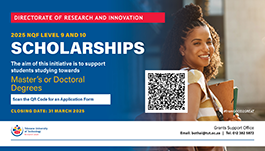Latest News
The African Journal of Sustainable Tourism (AJST), a pioneering academic journal committed to advancing knowledge and innovation in sustainable tourism across the African continent has just been launched.
According to Prof Uwe Hermann from the Tshwane University of Technology’s Department of Tourism Management, Faculty of Management Sciences the AJST will be a critical platform for scholars, practitioners and policymakers to share original, peer-reviewed research promoting responsible and inclusive tourism practices on the continent and in other developing countries.
The journal’s vision is Afrocentric, aiming to address the unique socio-cultural, economic and environmental dynamics that shape tourism development in the region, while also contributing to the achievement of the United National Sustainable Development Goals and beyond.
"Tourism is a powerful catalyst for sustainable development, but its potential in Africa remains underexplored. This journal is dedicated to showcasing African scholarship, amplifying local voices and fostering a dialogue that can drive real change in the industry," said Prof Uwe Hermann, Editor-in-Chief of the AJST.
Prof Uwe Hermann, Editor-in-Chief of the newly launched AJST
AOSIS, a reputable academic publisher in South Africa, publishes the AJST. For more information or to submit a manuscript, visit www.ajstjournal.org
By Thembeka Manetje
Three outstanding women made history when they earned their Doctor of Computing (Computer Systems Engineering) degrees from the Tshwane University of Technology's Faculty of Information and Communication Technology on 7 April 2025, This remarkable achievement stands out, not only because of their academic excellence but also due to the broader societal context in which it was accomplished.
In a field where ICT has long been perceived as a male-dominated field, the fact that all three of the University’s doctoral graduates in this discipline are women, is especially noteworthy. This accomplishment challenges the stigma surrounding the ICT sphere, proving that women can excel and lead in areas traditionally considered to be for males.
Drs Juliana Adeola Adisa, Dorcas Oladayo Esan and Moanda Diana Pholo’s respective pioneering research made unique and significant contributions to the field of computer systems engineering. Their work represents a powerful response to the biases that continue to exist in the tech world, offering inspiring examples of how women can shape the future of technology.
Three outstanding women, Drs Juliana Adeola Adisa, Dorcas Oladayo Esan and Moanda Diana Pholo, made history when they earned their Doctor of Computing (Computer Systems Engineering) degrees.
Adoption of Deep Learning Techniques for Prediction of Financial Crises: Bankruptcy and Credit Scoring
Dr Juliana Adeola Adisa’s research, titled "Adoption of Deep Learning Techniques for Prediction of Financial Crises: Bankruptcy and Credit Scoring," tackled critical financial issues. By employing a Binary Swarm Optimization (BPSO) technique alongside a Bi-LSTM-CNN-based Generative Adversarial Network (GAN) deep learning model, Dr Adisa developed the Particle Swarm Optimization Synthetic Feature Generative Adversarial Networks (PSOSF-GAN) – a novel hybrid deep learning model. This model combines a synthetic feature generation algorithm with BPSO for feature selection and a Bi-LSTM/CNN-based GAN to predict financial distress, offering a new tool for bankruptcy prediction and credit scoring.
Enhancement and Regeneration of 3-Dimensional African Artistic Images with Artificial Intelligence
Dr Dorcas Oladayo Esan’s thesis, "Enhancement and Regeneration of 3-Dimensional African Artistic Images with Artificial Intelligence," addressed challenges in the generation and accessibility of African art. With the aim of improving the quality and availability of 3D African art, Dr Esan utilized the Variational Autoencoder-Three-Dimensional Signed Distance Function Cycle Generative Adversarial Network (VAE-3DSDFCycleGAN) to enhance and regenerate 3D images from 2D African art. This breakthrough has significant implications for both artistic design and accessibility, helping preserve and share African culture in new and innovative ways.
Differentiating Lymphoma from Tuberculosis and COVID-19 Using Machine Learning and Natural Language Processing
Dr Moanda Diana Pholo’s research, titled "Differentiating Lymphoma from Tuberculosis and COVID-19 Using Machine Learning and Natural Language Processing," explored how artificial intelligence could be applied to medical diagnostics. By developing an AI-driven diagnostic framework, Dr Pholo’s study focused on using machine learning to differentiate between lymphoma, tuberculosis, and COVID-19, based on clinical indicators. This framework promises to improve disease classification accuracy and assist in more timely and effective diagnosis in healthcare settings.
Together, Drs Adisa, Esan and Pholo’s research embodies the transformative power of women in technology. Their groundbreaking contributions highlight the increasing need for diversity and inclusivity in the ICT sector, demonstrating that women are not only capable but are leading the way in shaping the future of technology, finance, healthcare and art.
FoICT proudly celebrates these remarkable women and looks forward to the lasting impact their work will have on the global stage. Their achievements serve as an inspiring reminder to all that barriers are meant to be broken and that women are integral to the advancement of the tech world.
By Kgothatso Monono
Prof Pius Owolawi, Assistant Dean at the Tshwane University of Technology’s Faculty of Information and Communication Technology (FoICT) had the honour of delivering an insightful keynote address titled “From Graduate to Game-Changer: Innovating Africa’s Future with AI” during the 7 April 2025 graduation ceremony at the Vaal University of Technology’s Faculty of Applied and Computer Sciences. His speech challenged graduates to become the architects of a new African narrative, one powered by technology, inspired by purpose and grounded in leadership.
Prof Pius Owolawi, Assistant Dean at the Tshwane University of Technology’s Faculty of Information and Communication Technology
In relation to transformation, innovation and agency, Prof Owolawi who is responsible for Industry Liaison, Special projects and Work Integrated Learning (WIL) used a powerful metaphor of an eagle and a lion to paint a vision of the graduate as a dual force of foresight and courage. “The eagle does not flap its wings wildly; it gracefully soars. Use your knowledge to rise above the chaos. See possibilities, see solutions. The lion, not the fastest nor the biggest animal, leads with a mindset. With strategy, let your roar be your ideas. Solve problems with grace and confidence.”
Prof Owolawi, an accomplished academic, engineer and industry expert, addressed the audience of graduates, parents, the faculty, industry leaders and dignitaries, including VUT Vice-Chancellor and Principal, Prof Khehla Ndlovu, emphasising that Africa is standing at the cusp of an AI revolution and the young minds that are graduating are its most powerful catalysts.
He spotlighted local innovations that defy the idea that tech breakthroughs are reserved for Silicon Valley: “From Kenya’s Twiga Foods using AI to reduce food waste, to Aerobatics in South Africa deploying drones for smart agriculture, to AI-powered medical drone delivery systems in Rwanda. These are not imported miracles; they are African success stories. Built by people just like you,” he said.
Pushing further into the cutting edge, he introduced graduates to the emerging frontiers of Generative and Agentic AI systems, not only creating content but adapting, thinking and acting. He urged students to lead in technological innovation and see themselves as job creators as well as problem solvers, armed with the tools of the fourth industrial revolution.
With poetic power, he closed his address by calling on the graduates to embrace both their “lion-hearted leadership and eagle-eyed vision,” leaving them with a powerful affirmation: “You are not simply engineers or developers, you are nation-builders, code-crafters, visionaries and game-changers.”
As the graduates crossed the stage and stepped into the next chapter of their lives, they did so not just with degrees in hand, but with a renewed sense of mission to shape the future of Africa, one innovation at a time.
Prof Owolawi addressed the audience of graduates, parents, the faculty, industry leaders and dignitaries.
By Phumla Mkize
Academic, columnist and orator Prof Tinyiko Maluleke flaunts his masterful storytelling, acute observation and trenchant wit in newly released book, Faces and Phases of Resilience: A Memoir of a Special Kind.
It is indeed a memoir of a special kind. Welded to Prof Maluleke’s life story are short and equally captivating biographies of his peers, heroes and heroines. Packaged in pithy essays, the book includes riveting reflections on leadership, politics, race, class, sustainability, language and gender.
Prof Maluleke’s gift for characterisation comes alive in his portrayal of key personalities in his life, giving readers a window into his upbringing in the hustle and bustle of Soweto, and the tranquillity of Valdezia, a village in Limpopo.
Self-portraits, profiles, opinion pieces, obituaries and travel guides collide, showcasing Maluleke’s authority in short-form writing. Above all, the book is an ode to the resilience of phenomenal boys and girls, and men and women, underscoring the challenging conditions of living in apartheid and democratic South Africa.
The opening chapter whirls readers in an eddy of emotions as a little Maluleke recollects his mother’s funeral and manner of her death. Belying the tragedy of four children left motherless and a grandmother faced with the role of primary caregiver, is the piercing commentary on migrant labour and its role in damaging the nucleus of black families – and women’s power and strength amid myriad struggles.
He writes: “In those days, young black women like her were spoilt for choice when it came to ways of dying – difficult pregnancy, childbirth, physical labour, heartache, hopelessness and domestic violence. Many women died from waiting, and not just waiting for husbands, as aptly observed by Njabulo Ndebele. The women of my mother’s time died from waiting for the rain … waiting for the life for which they went into matrimony for; waiting for respite; waiting for happiness.”
Prof Tinyiko Maluleke, author of the newly released book, Faces and Phases of Resilience: A Memoir of a Special Kind.
He opines about the denigration of black men at factories, mines and offices in big cities such as Joburg as he chokes with memories of his own migrant father.
“My respect for him grew when I realised how much abuse he stoically endured from his white bosses at No 216 Bree Street, Johannesburg, where he worked as a ‘tool boy’ and ‘tea boy’ … Instead of the assertive man he was among his friends and family at his matchbox house in Soweto, the Obed Huhlwani Maluleke of Bree Street was as meek as a lamb, even in the face of verbal abuse. On the homeward bound bus every evening, he would put his Dobbs hat on and seamlessly transform into the father I knew.”
Faces and Phases of Resilience is a celebration and a commemoration, affording the known and little-known people equal stature. In it, you meet Dudu Mokoa who is remembered for her diligence as a personal assistant in the higher education sector. Mokoa lives on in the pages of Maluleke’s book featured alongside trailblazers – Professors Puleng LenkaBula, Pamela Dube, Nokuthula Sibiya and Thoko Mayekiso.
Auditor-General Tsakani Maluleke and paediatric oncologist Dr Vhutshilo Netshituni-Loff, who have broken historical barriers in their fields, and the village giants who raised them, are lauded in equal awe. Black visionaries, geniuses and virtuosos are revered just as the 97-year-old village woman who dragged a grumpy six-year-old from an early morning slumber to enrol him at a local primary school is also revered. The boy grew up to become one of the leading voices in higher education.
Faces and Phases of Resilience is the first solo book by Prof Maluleke, a seasoned writer with several titles as co-author and co-editor, including Ecumenical Encounters with Desmond Tutu: Visions for Justice, Dignity and Peace, and The Legacy of Stephen Bantu Biko: Theological Challenges.
Prof Maluleke, the Tshwane University of Technology Vice-chancellor and Principal, has had an illustrious career in academia in South Africa and abroad, including in top positions at Universities of Pretoria, Johannesburg and South Africa.
He is a world-renowned scholar, who until 2024, was rated B1 (internationally acclaimed researcher) by the National Research Foundation. He has been a member of the Academy of Science for South Africa since 2013. He’s serving as the deputy chair of the National Planning Commission and contributes extensively to national publications as a columnist.
• Faces and Phases of Resilience, published by Tracy McDonald Publishers, is available at reputable books stores from 7 April 2025 and online.
Notices
- Test Week Timetable: FEBE and FMS (5 - 17 April 2025)
- A re ageng: ISRC Trust Fund
- 2025 Call for papers, conferences and workshops
- 2025 TUT Full-Time Study Postgraduate Scholarships
- Applications: How to upload your documents
- List of qualifications still open for 2025 intake
- 2025 Faculty of Arts and Design: Academic Plans
- 2025 Important information on Financial Aid
- Online Bus Registration Process
- Information regarding the Diploma in Traffic Safety and Municipal Police Management
- SRC Constitution
- Student Undertaking Form
- Students CRM communique and guide
- Examination Information
- ALERT: BEWARE OF APPLICATION AND REGISTRATION SCAMS























